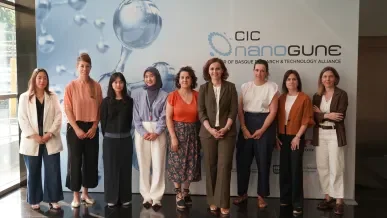MindSens, early detection of Alzheimer’s with a drop of blood
MindSens wins the III Global Graphene Call with a breakthrough dementia diagnostic device: a portable, accurate, and affordable home-use diagnostic tool that could bring early dementia detection into homes and clinics around the world. The international call launched by CIC nanoGUNE, BerriUp, Graphenea, Fomento de San Sebastián, and BIC Gipuzkoa, seeks revolutionary ideas that tackles the potential of graphene in industrial and technological applications.

The London-based MindSens is one of the winners of the III Global Graphene Call. This start-up project is developing a portable and low-cost device for the early detection of dementia—before symptoms appear- at University College London (UCL). The international call launched by CIC nanoGUNE, BerriUp, Graphenea, Fomento de San Sebastián, and BIC Gipuzkoa, seeks revolutionary ideas that tackles the potential of graphene in industrial and technological applications.
MindSens, is a UK-based HealthTech startup project that is developing a device for the early detection of Alzheimer’s using just a single drop of blood. The device integrates graphene in its sensors, leveraging a graphene field-effect transistor (GFET) where functionalized graphene surfaces interact with target analytes, altering conductivity for precise detection.
With a strong interdisciplinary and transnational team, composed of six professionals expanded in different nations covering the UK, Sweden, and Indonesia and, with established roles such as executive, business development, product design, software development, and R&D, the spin-off project is now seeking the right place to found the company. At the moment, Rica Asrosa a scientific researcher from Indonesia who is completing her PhD in Material Science at University College London (UCL), is based in Donostia-Sebastián developing the product in nanoGUNE under the III Global Graphene Call award. The team´s goal is to launch a spin-off company focused on accessible brain health diagnostics, beginning with dementia and expanding into other neurodegenerative conditions.
“There is no cure for dementia yet, but early detection can delay the onset of symptoms and help people to plan for the future. Our device makes that possible, even in low-resource settings where access to Magnetic Resonance Imaging (MRI) or laboratory testing is limited”, says Rica Asrosa.
With tests already validated in plasma and clinical human blood samples, the team is preparing for clinical trials and product design and standardization, with the aim of launching the product on the market soon afterwards.
"Being selected as the winner of the Global Graphene Call is an incredible opportunity. Easy access to state-of-the-art facilities and the collaborative environment enable me to advance my research considerably faster. I’m deeply grateful for the support and advanced infrastructure that are helping me push our project forward", says the young Indonesian researcher.
According to Rica Asrosa, “what makes this device stand out is its special sensing system, which uses modified graphene. While the basic graphene was supplied by Graphenea, all the chemical modifications were done independently at nanoGUNE using their in-house equipment. These tools were crucial for analyzing how the structure of the graphene changed and how those changes affected its sensing abilities”.
“Unlike traditional lab tests—which can be slow, expensive, and need centralized lab facilities—the technology we are developing gives results in just minutes from a small drop of blood on a strip. It doesn’t need any costly lab equipment or trained technicians to operate”, adds the researcher.
